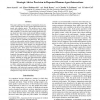Free Online Productivity Tools
i2Speak
i2Symbol
i2OCR
iTex2Img
iWeb2Print
iWeb2Shot
i2Type
iPdf2Split
iPdf2Merge
i2Bopomofo
i2Arabic
i2Style
i2Image
i2PDF
iLatex2Rtf
Sci2ools
148
click to vote
AAAI
2012
2012
Strategic Advice Provision in Repeated Human-Agent Interactions
This paper addresses the problem of automated advice provision in settings that involve repeated interactions between people and computer agents. This problem arises in many real world applications such as route selection systems and office assistants. To succeed in such settings agents must reason about how their actions in the present influence people’s future actions. This work models such settings as a family of repeated bilateral games of incomplete information called “choice selection processes”, in which players may share certain goals, but are essentially self-interested. The paper describes several possible models of human behavior that were inspired by behavioral economic theories of people’s play in repeated interactions. These models were incorporated into several agent designs to repeatedly generate offers to people playing the game. These agents were evaluated in extensive empirical investigations including hundreds of subjects that interacted with computers in...
| Added | 29 Sep 2012 |
| Updated | 29 Sep 2012 |
| Type | Journal |
| Year | 2012 |
| Where | AAAI |
| Authors | Amos Azaria, Zinovi Rabinovich, Sarit Kraus, Claudia V. Goldman, Ya'akov Gal |
Comments (0)

